|
|
|
Sort Order |
|
|
|
Items / Page
|
|
|
|
|
|
|
| Srl | Item |
| 1 |
ID:
139283
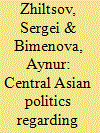

|
|
|
|
|
| Summary/Abstract |
This article analyzes the situation regarding the water resources of the transboundary rivers that developed in Central Asia after the collapse of the Soviet Union when the previous mechanism of mutual account of the interests of all the Central Asian republics broke down. Particular attention is given to studying the factors that have an impact on the formation and implementation of Central Asian politics regarding water use. A comparison is made of the international legal base that regulates conflicts involving the water resources of transboundary rivers and the legal documents of the Central Asian states. The paper analyzes the reasons for the failure to create a multisided mechanism for resolving the disputes that arise among the Central Asian countries with respect to water use of the transboundary rivers.
|
|
|
|
|
|
|
|
|
|
|
|
|
|
|
|
| 2 |
ID:
083642
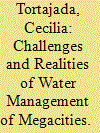

|
|
|
| 3 |
ID:
147933
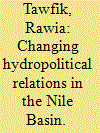

|
|
|
|
|
| Summary/Abstract |
A new hydro-political order is emerging in the Nile Basin. Upstream riparian states have improved their bargaining power vis-à-vis downstream countries by adopting a common position in the negotiations over a new framework agreement to govern the utilisation of the Nile waters. Some upstream riparians have unilaterally constructed hydraulic projects that threaten Egypt’s hegemonic position in the basin, the most notable of which is the Grand Ethiopian Renaissance Dam (GERD). Whether these developments will lead to a more equitable utilisation of water resources and a more cooperative order will depend on the policies of the riparian states, especially in the Eastern Nile. Respect of the Declaration of Principles on the GERD signed between Egypt, Ethiopia and Sudan could help build trust between the three countries after years of tensions around the project. Beyond that, a basin-wide plan for the utilisation of water resources would not only maximise the benefits from the river and address the common challenges facing the basin, but also reduce the political costs of tensions on future projects.
|
|
|
|
|
|
|
|
|
|
|
|
|
|
|
|
| 4 |
ID:
131226
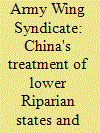

|
|
|
| 5 |
ID:
083637


|
|
|
| 6 |
ID:
076702
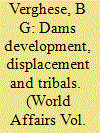

|
|
|
| 7 |
ID:
126218


|
|
|
|
|
| Publication |
2012.
|
| Summary/Abstract |
Decontaminating civilian facilities or large urban areas following an attack with Bacillus anthracis poses daunting challenges because of the lack of resources and proven technologies. Nevertheless, lessons learned from the 2001 cleanups together with advances derived from recent research have improved our understanding of what is required for effective decontamination. This article reviews current decontamination technologies appropriate for use in outdoor environments, on material surfaces, within large enclosed spaces, in water, and on waste contaminated with aerosolized B. anthracis spores.
|
|
|
|
|
|
|
|
|
|
|
|
|
|
|
|
| 8 |
ID:
152630
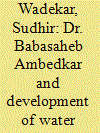

|
|
|
|
|
| Summary/Abstract |
Government of India decided to observe the birth anniversary of Dr. Babasaheb Ambedkar on April 14 as “Water Day” to sensitize people on managing the precious natural resource.1 Dr. Babasaheb Ambedkar is known as the ‘Architect of the Constitution of India. However, he is less known in the field of water resources.
|
|
|
|
|
|
|
|
|
|
|
|
|
|
|
|
| 9 |
ID:
081840
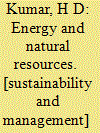

|
|
|
|
|
| Publication |
New Delhi, Vitasta Publishing Pvt td, 2008.
|
| Description |
xix, 619p.
|
| Standard Number |
9788189766795
|
|
|
|
|
|
|
|
|
|
|
|
Copies: C:1/I:0,R:0,Q:0
Circulation
| Accession# | Call# | Current Location | Status | Policy | Location |
| 053505 | 333.7/KUM 053505 | Main | On Shelf | General | |
|
|
|
|
| 10 |
ID:
089617


|
|
|
|
|
| Publication |
Washington, D C, World Bank, 2009.
|
| Description |
xviii, 189p.
|
| Standard Number |
9780821379400
|
|
|
|
|
|
|
|
|
|
|
|
Copies: C:1/I:0,R:0,Q:0
Circulation
| Accession# | Call# | Current Location | Status | Policy | Location |
| 054278 | 333.9106/HIR 054278 | Main | On Shelf | General | |
|
|
|
|
| 11 |
ID:
094253


|
|
|
| 12 |
ID:
125484


|
|
|
|
|
| Publication |
2013.
|
| Summary/Abstract |
Based on China's basic national energy conditions of "abundant coal and scarce gas reserve", the development of the coal based SNG industry is considered to be an effective way to solve the conflict between the supply and demand of natural gas and an important direction in the clean use of coal. Xinjiang is rich in coal resources and is listed by the central government as one of the main bases of the coal based SNG industry. Nearly 70% of the coal based SNG projects are being conducted in Xinjiang, with the goal to take advantage of the lower coal price in Xinjiang to promote the development of the coal based SNG industry. However, the coal based SNG industry is subject to the constraints of pollution, immature technology, poor economic returns, water resources and many other factors. Therefore, the development of the coal based SNG industry should be limited to industrial demonstration. Taking into account China's energy security and environmental governance, once the technology matures, the development prospect of the coal based SNG industry is broad.
|
|
|
|
|
|
|
|
|
|
|
|
|
|
|
|
| 13 |
ID:
134128
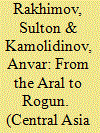

|
|
|
|
|
| Publication |
2014.
|
| Summary/Abstract |
Recently, the problems related to water usage in the Central Asia Region have not left the pages of the media and Internet websites. Particular attention is being focused on the most urgent topic-building hydropower stations on the upper reaches of the Amu Darya and Syr Darya rivers, which are the region's main water arteries.
This article presents an analysis of the water situation in the Amu Darya Basin, including the reasons for the shrinkage of the Aral Sea. It draws a picture of how water resources form, are distributed, and used in the Amu Darya Basin, and gives probable forecasts of the potential positive and negative consequences of building the Rogun Hydropower Plant, keeping in mind the influence of the current global challenges and threats for the region. It draws attention to the weak regional cooperation and the possible development of negative trends caused by limited integration. The difficulties associated with stable water supply to the region's countries can only be avoided by establishing cooperation among them
|
|
|
|
|
|
|
|
|
|
|
|
|
|
|
|
| 14 |
ID:
056847


|
|
|
| 15 |
ID:
104274
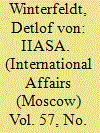

|
|
|
|
|
| Publication |
2011.
|
| Summary/Abstract |
International Affairs: The Soviet Union and the United States joined hands to establish the International Institute for Applied Systems Analysis (IIASA) at the height of the Cold War, a geopolitical standoff. What prompted the two superpowers during the era of confrontation to start an organization of this sort?
Prof. Detlof von Winterfeldt: It started with a conversation between President Johnson and Premier Kosygin in the United States; it was connected to a meeting they had at the UN at that time. One of the topics they discussed was essentially something you may consider science diplomacy, or diplomacy through science. And the idea was born that an international institute founded primarily by the Soviet Union and the United States and their respective allies would be a good vehicle to study problems of joint interest, problems of the industrialized countries that we shared, like pollution and energy. And also behind that, I believe, was the aspect that it would be good for both blocs if scientists could meet unencumbered with ideological, political issues and they could meet to exchange ideas, for a mathematician is a mathematician whether he is a communist mathematician or a capitalist mathematician. So soon after that meeting between Johnson and Kosygin, their advisers, and especially McGeorge Bundy of the United States and Dzhermen Gvishiani of the Soviet Union were the main men who moved this forward. And in 1972, IIASA was born, and Austria provided it with a castle, and we pay only a nominal fee for the castle, less than one euro a year. And so, we've been there since 1972, and the emphasis of research has shifted somewhat.
|
|
|
|
|
|
|
|
|
|
|
|
|
|
|
|
| 16 |
ID:
160533
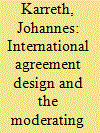

|
|
|
|
|
| Summary/Abstract |
Much of international cooperation research has long assumed that building and deepening (i.e. institutionalizing) international agreements can substitute for weak domestic bureaucratic capacity when it comes to promoting cooperative policies between countries. Qualifying this assumption, we argue that domestic bureaucracies are a key piece of international cooperation: the cooperation-inducing effect of international institutions is conditional on the quality of domestic bureaucracies. We examine this relationship in the context of the politics of interstate cooperation over transboundary rivers, an important test case given concerns about looming water conflict in the face of increasing water scarcity. Using data on freshwater-related events, 1984–2006, on the level of institutionalization of river treaties, and on the quality of domestic bureaucracy, we find that domestic bureaucracies moderate the ability of international institutions to elicit cooperative interstate behavior. The finding is robust to a multitude of specifications and provides important implications for institutional research and policy approaches to cooperation problems beyond freshwater.
|
|
|
|
|
|
|
|
|
|
|
|
|
|
|
|
| 17 |
ID:
076701


|
|
|
| 18 |
ID:
173340


|
|
|
|
|
| Publication |
New Delhi, Pentagon Press, 2020.
|
| Description |
xiv, 378p.hbk
|
| Standard Number |
9789390095063
|
|
|
|
|
|
|
|
|
|
|
|
Copies: C:1/I:0,R:0,Q:0
Circulation
| Accession# | Call# | Current Location | Status | Policy | Location |
| 059892 | 954.6/KUM 059892 | Main | On Shelf | General | |
|
|
|
|
| 19 |
ID:
083645


|
|
|
| 20 |
ID:
132487
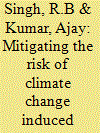

|
|
|
|
|
| Publication |
2014.
|
| Summary/Abstract |
The world's climate is continuing to change at rates that are projected to be unprecedented in recent human history. The risks of climate change and extreme climatic events such as drought and ?ood have dramatic impacts on economy and natural systems. Agriculture, livestock and water resources are among the most vulnerable systems. Resilience and adaptive capacity of traditional networks and land use systems to cope with climate variability/extremes are weakening, while ' frequency and magnitude of climate variability and land use intensity are in rise. Thus it is important to take timely action in order to reduce the risk of climate change.
|
|
|
|
|
|
|
|
|
|
|
|
|
|
|
|
|
|
|
|
|